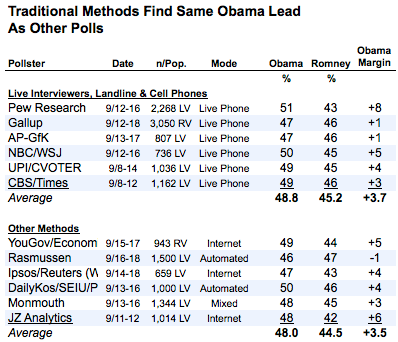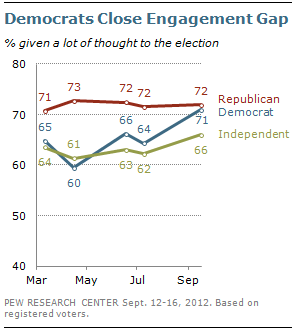WASHINGTON -- A dozen national polls conducted over the past week have produced a range of results, mostly indicating either a dead heat or a narrow advantage for President Barack Obama over Republican nominee Mitt Romney. A new survey from the Pew Research Center, however, gives Obama his biggest lead yet.
The Pew Research survey shows Obama running 8 percentage points ahead of Romney (51 to 43 percent) among 2,192 likely voters interviewed from Sept. 12 to 16, a period that began a week after the Democratic convention.
This result is more favorable to the president than other recent polls, including two daily tracking surveys that picked up a bump for Obama last week and then saw it largely fade in recent days. The most recent update of the Gallup Daily tracking, which like Pew Research uses live interviewers to call voters at randomly selected landline and mobile phone numbers, gives Obama a lead of just 1 point (47 to 46 percent). Gallup's interviews were conducted from Sept. 12 to 18.
As of this hour, the HuffPost Pollster tracking model, based on all available public polls, shows Obama with a lead of slightly more than 2 points nationwide.
Pew Research has typically produced results a few percentage points better for Obama than other polls, but Pew's earlier results reflected all registered voters. This survey marks the first by Pew Research in 2012 to report results for the narrower slice of voters deemed most likely to actually vote. Among a larger sample of registered voters, Pew shows a 9-point Obama advantage (51 to 42 percent), roughly the same as the margin it found among registered voters in late July (51 to 41 percent).
The range of results among the various pollsters are not obviously explained by any of the usual differences, including timing, the mode of the interviews (whether they were conducted by a live interviewer, with an automated recorded voice, or via the Internet), and the nature of the samples (landline and mobile phones, landline phones only, or an "opt-in" panel of Internet volunteers).
A simple average of the last six national polls that, like Pew Research, used live interviewers to call random samples of landline and mobile phones has Obama doing only slightly better (+3.7 points) than the average of the six pollsters using other methods (+3.5 points).

One of the most striking aspects of the Pew Research survey, which may help explain why its results are more favorable to the president, is the surge of enthusiasm it captured among Democrats. All year, Pew Research surveys have found a roughly 10 point "engagement gap" between the percentages of Democrats and Republicans who say they have given a lot of thought to the election. But on this most recent survey, Pew writes, Democratic engagement "spiked" and the gap "has largely disappeared." Moreover, Democratic voters are now as likely as Republicans to report following campaign news closely and "are as committed to voting, and as certain of their vote, as are their GOP counterparts."

This surge in engagement helps to explain why Pew Research found very little difference in vote preference between all registered voters and the narrower slice of those deemed most likely to vote. Differences among other pollsters in the way they select and model "likely voters" may explain a lot of their variation.
But the larger significance is this: The Obama campaign made boosting enthusiasm among its base one of its main goals for the convention period, knowing that his victory in 2008 had depended on turning out many younger and non-white voters who cast their first ballots or who did not typically vote. Whether Obama maintains this polling lead, be it big or small, is ultimately less important than whether non-regular Democratic voters turn out in something approaching the rate at which they participated four years ago.
So as the election approaches, keep an eye on the enthusiasm gap.

